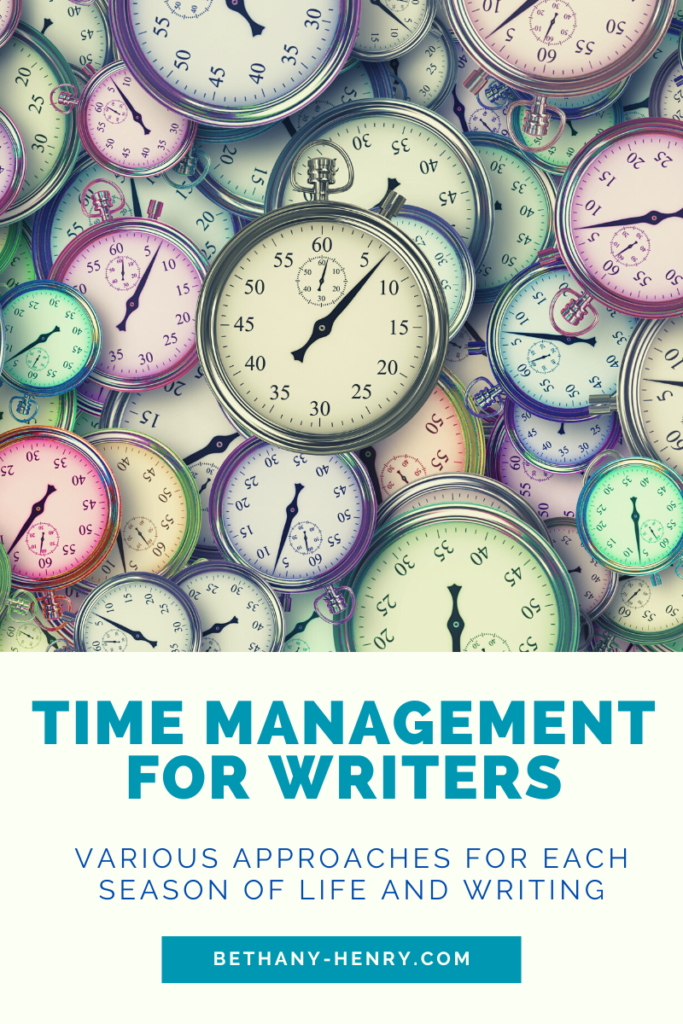
For writers (and probably everyone!) time management will always be crucial. Life gets busy so quickly and before you know it, the day (or week/month/year!) has flown right by.
Even if the stars align and I have a bunch of time on my hands, somehow it still is difficult to get everything done. So what gives?
Today we’re looking at various approaches to time management, three tried-and-true tools to use, different seasons of life and writing, and three core critical elements to consider as we sort out what routines may work for us.
After all, we are writers and makers of our own destinies! We won’t let a paltry thing like time (or the lack of it) stand in our way! 😉
Time Management For Writers
“A writer who waits for ideal conditions under which to work will die without putting a word on paper.”
E. B. White
“If we wait for the moment when everything, absolutely everything is ready, we shall never begin.”
Ivan Turgenev
Writing won’t happen for most of us by accident. We must be intentional and proactive to get anything done.
Every single one of us is different (which is a good thing!) and that means different approaches to productivity, time management, and writing may work better for each of us. Often we may find that our personal writing and productivity styles may change over time as well!
All of this means we should be flexible and self-aware as we experiment with various routines to find what may be a good fit for us personally.
Various Time Management Approaches
Some people prefer to schedule out every moment of their day while others prefer a more loose idea of what needs to happen. Where do you fall on the scale?
Do you prefer…
- Early mornings or late evenings?
- Strict schedules or loose concepts?
- Every day the same or lots of variety?
- Large blocks of uninterrupted time or lots of short chunks?
What approaches do you find yourself resonating with? What have you tried- and did it work?
Various Time Availability
Our season of life will greatly affect what our writing time can look like.
- Do you have lots of time available or is it hard to find three minutes to use the bathroom?
- Do you have lots of distractions constantly surrounding you or is it too quiet?
- Do you have a predictable schedule or are things frequently changing?
- Do you have too much on your mind or do you have available brainspace?
If we have large chunks of available time, it can be a great goal to spend two hours uninterrupted each morning on our writing. However, if our time is more limited, a good goal could be to spend 20 minutes writing at lunch.
What does your time availability look like these days?
It’s all about identifying where we’re at and what time we have to work with!
Various Writing Stages
Different parts of our writing may flourish under different routines.
For instance, some people may prefer to proofread in short, 5-15 minute chunks of time but they may need an hour to get anything accomplished when writing a first draft. Brainstorming, outlining, drafting, and editing may all have their unique challenges and we may find that adapting our schedules accordingly can help us to be more productive overall.
What writing stages are you in today and what might that mean for your time management routines?
3 Tried-And-True Tools
We often don’t need to reinvent the wheel or spend our limited energy rehauling our entire lives to fit in with some new and shiny “perfect” way of doing things! Sometimes simple is best.
1- Setting Goals
This is a core of time management, because without a goal it’s hard to know what we are even managing our time for.
What are your goals?
If you could structure your days and energy to focus on anything, what would it be?
What other responsibilities need to be included?
Are there any tasks that can be dropped?
For more reading check out Not Just Any Old Goals: Creating Goals That Work.
2- Making Lists
I know, sometimes to-do lists can get a bad rap. But they are useful.
The truth is, our brains are trying to keep track of too much! Keeping a simple list of tasks can free up our energy and attention to focus on other things. Whether it’s a to-do list, a weekly menu, or a list of questions to research further, just putting these down on paper or saving them on our phones can be really helpful.
It’s simple and it works!
3- Set Timers
Here’s another incredibly simple tool. We probably all have a timer built into our phones or have one on our microwave. But when was the last time you used it?
Setting a timer can be a good way to really focus on the task at hand for a set period of time, knowing we won’t miss anything important. It frees us (and forces us!) to set aside distractions.
3 Critical Elements of Time Management
Our time management may look like a lot of different things and will probably change over time, but it should always include these three elements.
1- Prioritizing
If we had to sum time management up in one word, this is it! Prioritize.
We don’t have time to do it all. And we don’t have to! The trick is to identify our priorities and then actually work on those things first.
I can’t tell you how many times I’ve spent an afternoon replying to emails that didn’t even matter instead of writing my book. Or maybe I’m reading nerdy memes and online comics. Now, there isn’t anything wrong with nerdy memes and online comics. (Send your favorites my way! 🙂 ) But they have a time and a place and my writing time isn’t it.
We need to identify our priorities, focus, and set boundaries.
None of those things are easy but we can improve with practice! We need to make prioritizing a priority 😉
2- Identifying Fears and Distractions
Even once we’ve identified our priorities (ie: complete our current writing project!), it can be all too easy to think of all the reasons why we should put it off and maybe go check email. Or do the laundry.
Spoiler: There will always be something else we could be doing. And when our writing is hard it is easier to take the convenient excuse over the inconvenient work.
“The enemy is our chattering brain, which, if we give it so much as a nanosecond, will start producing excuses, alibis, transparent self-justifications, and a million reasons why we can’t/shouldn’t/won’t do what we know we need to do.”
Steven Pressfield
Identifying our own distractions and fears can help us be more aware of their sneaky ways and therefore reduce their control over us.
For example, I’ve found I can get sucked into email-land which leads me down a million different rabbit trails if given half a chance.
The solution? I need to do my first writing tasks before checking my email. Simple enough, right? The email-checking is sometimes still a hard distraction to avoid. But moving my writing time first is honestly a very effective strategy.
Identifying our fears and distractions isn’t a magic solution. But it’s a powerful first step in helping us adapt strategies to navigate them more efficiently.
3- Getting Back On Track
Because we will ALWAYS get off track at some point or another.
The key is to recognize when we’re off course and to get ourselves pointed back in the right direction.
Maybe this looks like regular weekly/monthly/quarterly self check-ins to evaluate your progress, or maybe it’s something less formal.
What matters is that when we find our schedules are a mess and maybe the writing time isn’t where we’d like it to be, we can try again. Each day is a new day, my friends!
“No one wins them all, and your failures, when they happen, are just part of your growth. Shake off your blunders. How will you know your limits without an occasional failure? Never quit. Your turn will come.”
Og Mandino

What about you? Strategies To Find Your Best Routines
Personality wise, what writing routines appeal to you?
Where are you at with life these days and where does (or could!) writing fit into that?
What are your current priorities in life? What are your creative priorities? What routines would help you take the next steps towards your goals?
What fears or distractions are present in your life and writing times?
What one change would you like to see happen in your time management routines? What’s stopping you?
There isn’t a one-size-fits-all approach to time management and I don’t think that’s a bad thing! Hopefully we can each find what works for us in the season we’re at.
Happy writing to you today! 🙂




